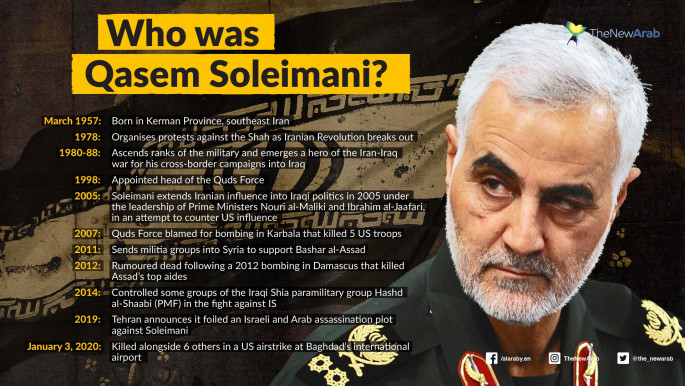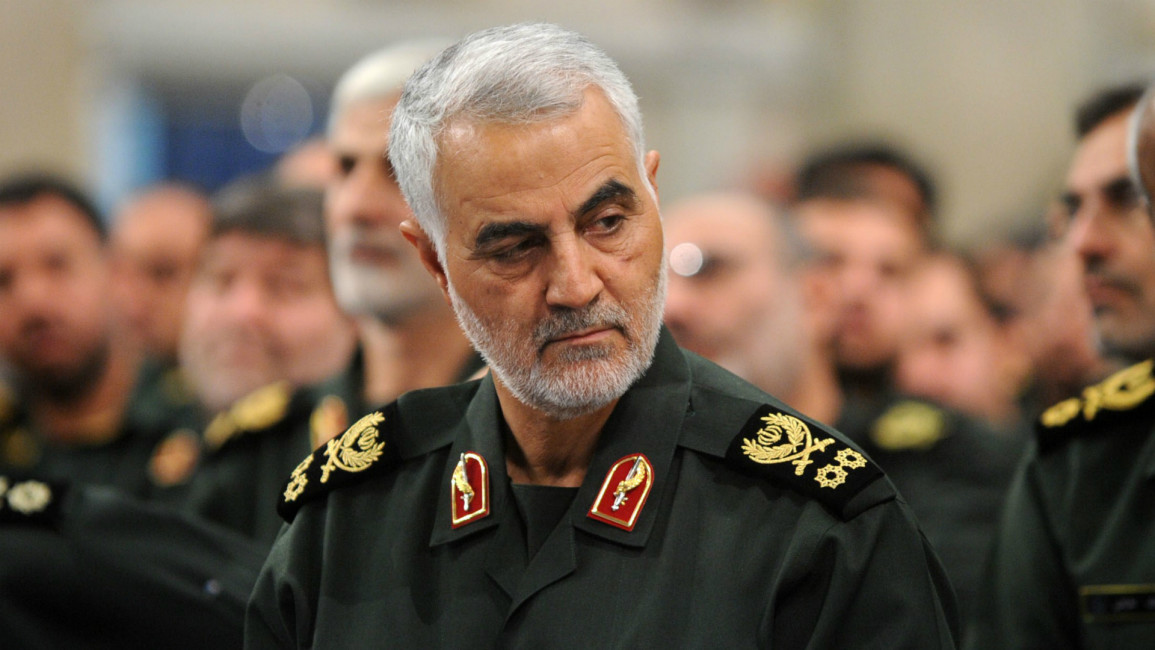Qasem Soleimani killing was 'self-defence', US tells UN
Qasem Soleimani killing was 'self-defence', US tells UN
According to the UN Charter, states are permitted to respond in self-defence.
2 min read
Tehran also said it responded to the strike in self-defence [Getty]
The killing of top Iranian general Qasem Soleimani in a US drone strike last week was "self-defence", the United States told the United Nations on Wednesday.
In a letter to the UN Security Council, Ambassador Kelly Craft said the strike, which killed nine others including Iraqi militia leader Abu Mahdi Al-Muhandis, was a necessary response to "an escalating series of armed attacks in recent months", Reuters reported.
The aim of the strike was to deter the Islamic Republic from conducting or supporting further such attacks and degrade its ability to do so, she said.
Under Article 51, UN member states are required to "immediately report" to the Security Council any action taken in exercising the right to self-defence.
Critics have condemned Washington's strike on Soleimani as violating international law. While the UN Charter allows for a state to act in self-defence, Agnes Callamard has said the strike is unlikely to meet that definition.
"The test for so-called anticipatory self-defence is very narrow: it must be a necessity that is 'instant, overwhelming, and leaving no choice of means, and no moment of deliberation'," Callamard, UN special rapporteur on extra-judicial killings, said in a tweet last week. "This test is unlikely to be met in these particular cases."
Read more: Iran's missile strike against US in Iraq was more symbolic than lethal
Ambassador Craft has justified the strike on the basis of Article 51 and said in her letter on Wednesday that the US was "prepared to take additional actions in the region as necessary to continue to protect US personnel and interests".
For his part, Iran's Ambassador to the UN Majid Takht Ravanchi wrote to the Security Council that the Islamic Republic had responded "in self-defence" by "targeting an American air base in Iraq".
Tehran fired 22 missiles at two Iraqi military bases hosting US and other foreign troops early on Wednesday.
"The operation was precise and targeted military objectives thus leaving no collateral damage to civilians and civilian assets in the area," Ravanchi said.
In a letter to the UN Security Council, Ambassador Kelly Craft said the strike, which killed nine others including Iraqi militia leader Abu Mahdi Al-Muhandis, was a necessary response to "an escalating series of armed attacks in recent months", Reuters reported.
The aim of the strike was to deter the Islamic Republic from conducting or supporting further such attacks and degrade its ability to do so, she said.
Under Article 51, UN member states are required to "immediately report" to the Security Council any action taken in exercising the right to self-defence.
Critics have condemned Washington's strike on Soleimani as violating international law. While the UN Charter allows for a state to act in self-defence, Agnes Callamard has said the strike is unlikely to meet that definition.
"The test for so-called anticipatory self-defence is very narrow: it must be a necessity that is 'instant, overwhelming, and leaving no choice of means, and no moment of deliberation'," Callamard, UN special rapporteur on extra-judicial killings, said in a tweet last week. "This test is unlikely to be met in these particular cases."
Read more: Iran's missile strike against US in Iraq was more symbolic than lethal
Ambassador Craft has justified the strike on the basis of Article 51 and said in her letter on Wednesday that the US was "prepared to take additional actions in the region as necessary to continue to protect US personnel and interests".
For his part, Iran's Ambassador to the UN Majid Takht Ravanchi wrote to the Security Council that the Islamic Republic had responded "in self-defence" by "targeting an American air base in Iraq".
Tehran fired 22 missiles at two Iraqi military bases hosting US and other foreign troops early on Wednesday.
"The operation was precise and targeted military objectives thus leaving no collateral damage to civilians and civilian assets in the area," Ravanchi said.
"Seriously warning about any further military adventurism against it, Iran declares that it is determined to continue to, vigorously and in accordance with applicable international law, defend its people, sovereignty, unity and territorial integrity against any aggression."
Follow us on Twitter and Instagram to stay connected
 |


![Minnesota Tim Walz is working to court Muslim voters. [Getty]](/sites/default/files/styles/image_684x385/public/2169747529.jpeg?h=a5f2f23a&itok=b63Wif2V)




![Debris near Rafic Hariri International Airport [Getty]](/sites/default/files/styles/image_212x120/public/2176162423.jpeg?h=a5f2f23a&itok=XLiO6WHk)
![An Israeli air strike on Jabalia killed teenage journalist Hassan Hamad [Screengrab/X]](/sites/default/files/styles/image_330x185/public/2024-10/hassan%20hamad1.jpg?h=c12e0b96&itok=Rd_dyCVp)
